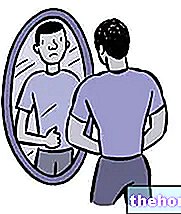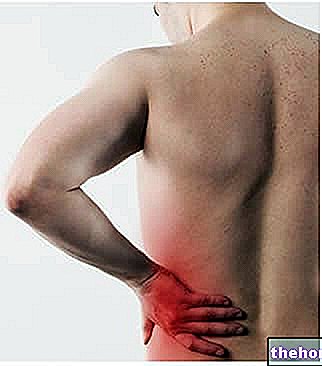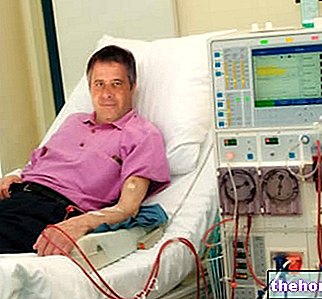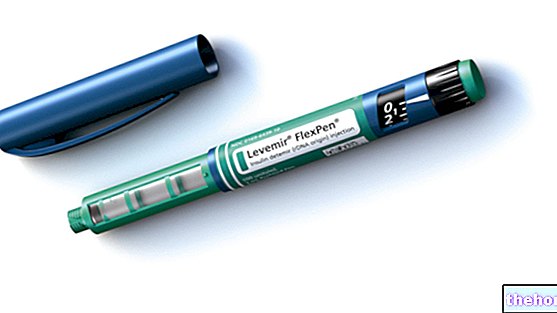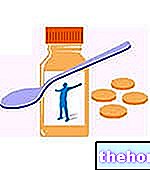Generality
Anorexia nervosa is a particularly serious eating disorder. Those affected suffer from marked weight loss, due to a morbid fear of gaining weight and a distorted view of their body image.

The symptomatology of anorexia nervosa is very broad and mainly depends on the fear of gaining weight. This fear causes the patient not to eat adequately and, for this reason, develops a series of problems related to the absence of food.
The therapy includes psychotherapy treatments and interventions aimed at restoring normal body weight.
What is anorexia nervosa?
Anorexia nervosa, or simply anorexia, is a serious eating disorder, which, in those affected, is a reason for:
- an "excessive weight loss,
- a strong fear of gaining weight
- a distorted view of one's body image.
The anorexic subject, in fact, is very thin, constantly monitors his own body weight, avoids eating and sees himself more "fat" than he really is.
Anorexia nervosa disrupts a person's life, as weight-related thinking interferes with any other daily activity, from school or work to interpersonal relationships.
EPIDEMIOLOGY
Anorexia nervosa is a purely female eating disorder, even if, in recent years, it is spreading more and more also in the male population.
According to some estimates, relating to the Western World, women with anorexia nervosa would be between 9 and 43 per 1,000 (ie between 0.9 and 4.3%); while, men with anorexia nervosa would be at most 3 out of 1,000 (ie about 0.3%).
Typically, affected individuals are adolescents, aged between 14 and 17 years.
Causes
The precise causes of anorexia nervosa are unclear. According to doctors and experts in the field, a set of biological, psychological and environmental factors contribute to its appearance.
BIOLOGICAL FACTORS
Based on some scientific findings, some researchers argue that the onset of anorexia nervosa is linked to a genetic predisposition.
In other words, they believe that the expression of certain genes is a contributing factor to anorexia nervosa.
At the present time, the aforementioned theory still has some outstanding points, which only future research will be able to definitively clarify.
PSYCHOLOGICAL FACTORS
By analyzing the psychological profile of people with anorexia nervosa, eating disorder experts have noted that many sufferers have a certain type of character / behavior in common. For this reason, they thought that the onset of anorexia nervosa is related, in some way, to an individual's personality and behavioral traits.
Going into the details of the aforementioned study, the people temperamentally predisposed to develop anorexia nervosa would be:
- Those who have a marked tendency to suffer from anxiety or depression.
- Those who have difficulty managing stress.
- Those who worry easily about the future or who are, for some reason, afraid of it.
- Perfectionist subjects, who set themselves rigorous goals and who are very demanding of themselves.
- Particularly reserved individuals.
- Those who have obsessions / compulsions or who suffer from so-called obsessive-compulsive disorder.
ENVIRONMENTAL FACTORS
Premise: an environmental factor is any circumstance, event or habit that can affect the life of an individual, to a certain extent.
In the opinion of doctors and eating disorder specialists, the most important environmental factor associated with the emergence of anorexia nervosa would be the media exposure to the myth "thin equals beautiful", typical of modern Western culture.
Moreover, if we consult any magazine or watch television, we have a "high probability of running into advertisements that have as protagonists women and / or men, often successful, with a lean physique and free from imperfections.
In addition to the media's exaltation of thinness, other environmental factors that seem to contribute, more or less markedly, to the development of anorexia nervosa are:
- The practice of sports or work activities in which it is important to have an extremely thin physique. This is the case, for example, of those who do dance or artistic gymnastics or models who parade as a profession. For all these individuals, weight control is a must.
- The emotional stress that can sometimes derive from the death of a loved one, from a change of home or school, from the loss of work, from the end of a couple relationship, etc.
- The anatomical changes that occur during puberty. During the years of puberty, the human body undergoes several changes. If particularly evident, these modifications could represent a profound discomfort for some individuals, especially if the latter are the object of ridicule or particular attention from their peers.
All this would explain, in part, why anorexia nervosa mainly affects young people. - Membership in the female sex. Compared to men, women pay more attention to body weight and this could be the reason why they are more prone to get sick with anorexia nervosa.
- The presence in the family of people with anorexia nervosa or other similar eating disorders. Situations of this kind could emotionally involve some family members and induce, in the latter, the development of problems of the same nature. Generally, the subjects on which the sight of a family member with anorexia nervosa is most impressive are adolescents.
- A poorly controlled weight loss diet.
- L "having been victims of physical violence or sexual abuse. According to some studies, there is a certain correlation between episodes of this kind and anorexia nervosa.
Symptoms and Complications
To learn more: Anorexia symptoms: how to recognize it?
Anorexia nervosa presents a series of physical symptoms and signs and a series of behavioral manifestations.
The physical symptoms and signs are the consequence of an insufficient diet (physical symptoms), while the behavioral manifestations depend on the fear of gaining weight and on the distorted vision of one's own body image (behavioral symptoms).
PHYSICAL SYMPTOMS
An inadequate diet has numerous physical consequences. In fact, it determines:
- Weight loss. Typically, in patients with anorexia nervosa it is extreme.
- Obvious thinness
- Feeling of recurring fatigue. The sick feel it more when they begin to move.
- Insomnia
- Dizziness and dizziness
- Bluish discoloration of the fingers
- Hair thinning, breakage and / or loss
- Constipation
- Absence of menstruation in women
- Lanugo, i.e. the appearance of a fine and soft hair in some parts of the body (for example the face)
- Dry and / or yellowish skin
- Cold intolerance
- Abnormal heart beat (arrhythmias)
- Hypotension
- Dehydration
- Osteoporosis
- Edema in the arms and legs
- Abnormalities in the number of blood cells
- Reduced libido, i.e. poor sexual drive
BEHAVIORAL SYMPTOMS AND EMOTIONAL SPHERE
The fear of gaining weight and the conviction of being fat induce patients with anorexia nervosa to engage in abnormal behaviors aimed at weight loss.
These abnormal behaviors usually include:
- The observance of a highly restrictive diet, if not a real fast. This, then, is what causes the physical manifestations reported above.
- The exhausting and continuous practice of physical activity.
- Self-induced vomiting, to eliminate the food taken and which the patient believes can induce weight gain. In general, this behavior is also associated with the intake of laxatives, diuretics, purgatives and other similar products.
- The obsessive counting of calories consumed daily.
The fear of gaining weight and the idea of being fat strongly affect the life of a patient with anorexia nervosa. The latter, in fact, is generally a person who:
- He is almost solely concerned with food and measuring his own body weight.
- Skip the canonical meals.
- He is flat-tempered and lacking in emotion.
- He isolates himself from the social context and struggles to establish / maintain relationships with other people.
- He is irritated or tends to get irritated easily.
- He lies about everything related to food, claiming that he ate when he didn't.
- It lies about its weight.
- Suffers from moments of depression.
- Has suicidal tendencies (in severe cases).
WHEN TO SEE THE DOCTOR?

To convince them otherwise, the support of relatives and friends is essential, who must insist, in every way, on the importance of starting a therapy. ad hoc.
Some sufferers are good at hiding the aforementioned symptoms and weaknesses and this could complicate the situation considerably.
It is important to act promptly, because, due to prolonged fasting, the health conditions of patients could worsen in a marked way, to the point of seriously endangering their life.
COMPLICATIONS
Anorexia nervosa can have various complications, which can strongly affect the health and well-being of those affected.
Some of the most important complications are:
- Anemia;
- Heart problems, such as mitral valve prolapse, cardiac arrhythmias and heart failure;
- Muscle (muscle atrophy) and / or bone (osteoporosis) problems;
- Sexual problems, such as infertility (in women) and erectile dysfunction (in men);
- Circulatory problems, such as persistent hypotension
- Gastrointestinal problems (constipation, abdominal swelling, abdominal pain, etc.) with a persistent character;
- Kidney damage
- Anomalies affecting the electrolytes present in the "organism. Generally, they tend to alter the levels of potassium, sodium and chlorine;
- Damage to the brain and peripheral nerves;
- Persistent depression and / or anxiety;
- Personality Disorders and Obsessive Compulsive Disorders;
- Addiction to alcohol or other substances.
Diagnosis
Faced with a suspected case of anorexia nervosa, doctors generally resort to a scrupulous physical examination, some laboratory tests, an assessment of the patient's psychological profile and some instrumental tests to assess the health of certain organs. vital (heart in the first place).
Although they are not specific, these tests are very useful, as they usually allow to establish precisely what the problem is in progress.
For the purposes of a correct diagnosis of anorexia nervosa, it is also important to remember the importance of consulting the so-called Diagnostic and Statistical Manual of Mental Disorders (DSM).
The DSM is a collection of all the peculiar characteristics of known psychic and mental illnesses, including the respective criteria required for diagnosis.
OBJECTIVE EXAMINATION
The physical examination consists mainly of measuring the so-called body mass index (or BMI).
The body mass index is a very significant parameter, on which doctors base most of the assessments regarding the body weight of an individual.

Remembering that a person of normal weight has a body mass index between 18.5 and 24.9, in order to be able to speak of anorexia nervosa a subject must have a BMI equal to and less than 17.5.
Upon completion of the physical examination, the doctor observes the appearance of the skin, measures blood pressure and temperature, listens to the heart and checks muscle tone with appropriate physical exercises.
BMI calculation
Enter the data in the following calculation form to get an assessment of your body weight.
LABORATORY ANALYSIS
Laboratory tests generally include a complete blood count and an assessment of the level of the various electrolytes. All this allows the doctor to establish the health status of important organs, such as the liver, kidneys and thyroid.
EVALUATION OF THE PSYCHOLOGICAL PROFILE
The assessment of the psychological profile is usually the responsibility of an expert in the field of mental and psychological illnesses.
Briefly, it consists of a questionnaire, in which the specialist asks the patient to describe their thoughts, habits and relationship with food.
INSTRUMENTAL EXAMINATIONS
The instrumental tests allow the doctor to know the severity of the anorexia nervosa in progress, whether or not it has resulted in complications, etc.
In fact, they consist of tests, such as chest x-rays and electrocardiograms, which clarify the functionality and state of health of the patient's heart.
DIAGNOSIS ON THE BASIS OF DSM
According to the latest edition of the Diagnostic and Statistical Manual of Mental Disorders, an individual suffers from anorexia nervosa if:
- He eats less food than his body needs to function at its best.
- He has an extreme fear of gaining weight and engaging in abnormal behaviors to avoid gaining weight.
- He has a distorted view of his body image, seeing himself fat and in need of weight loss.
Treatment
The treatment of anorexia nervosa is complex and requires the collaboration of specialists, such as dieticians, doctors with expertise in eating disorders, psychiatrists and psychologists.
In fact, a person suffering from anorexia nervosa needs not only a dietary plan ad hoc, but also of adequate psychological support (psychotherapy).
In other words, the goal of therapy is to cure the body (ie the physical symptoms) and, at the same time, also cure the mind (ie the behavioral symptoms).
As stated, it is important to act quickly and when the disease is in its early stages and has not yet induced the appearance of complications.
Fundamental point: the patient's awareness of suffering from a serious illness, which requires treatment, is the starting point for achieving healing.
Subjects with anorexia nervosa, who reject their condition as sick, do not undergo any treatment or, in any case, struggle to follow the planned therapeutic path regularly.
WHERE DOES THERAPY TAKE PLACE?
For most cases of anorexia nervosa, treatment is outpatient. This means that the patient receives all the care he needs, attending a specialized hospital center every day and returning home at the end of each therapeutic session.
In other words, the patient has a schedule of appointments to follow, established by the team of doctors who have taken care of him. Outpatient treatments are very advantageous, because they avoid the inconvenience of hospitalization for the patient.
Treatment involves hospitalization when, in the opinion of doctors, the disease is at an advanced or severe stage. In these situations, in fact, patients need continuous medical assistance.
PSYCHOTHERAPY
Psychotherapy for anorexia nervosa includes several types of treatments:
- Cognitive-analytical therapy (or CAT). It is based on the theory that certain mental disorders and certain behaviors, such as those that characterize anorexia nervosa, derive from particular past life experiences.
The therapist who practices CAT has, as a goal, to remind the patient of past life events, which triggered certain mental disorders and certain behaviors, and to help him find a remedy. - Cognitive-behavioral therapy. It consists in preparing the patient to recognize and master the so-called "distorted thoughts" - that is, the behavioral symptoms - induced by "anorexia nervosa.
It includes a part "in the studio", with the psychotherapist, and a part "at home", reserved for the exercise and improvement of mastery techniques. - Interpersonal therapy. It is based on the "idea that interpersonal relationships and with the outside world in general have a" decisive influence on a person's mental health.
According to those who practice this type of psychotherapy, anorexia nervosa is attributable to feelings of low self-esteem, anxiety and insecurity, born as a result of a problematic relationship with other people.
The therapeutic goal is to find out which interpersonal relationships triggered the development of the eating disorder and to remedy them. - Family therapy. It is a type of psychotherapy that affects the whole family of the patient.
Those who practice this type of treatment maintain that an individual can recover from a disorder such as anorexia nervosa, only if his family members (who spend a lot of time with him) also know the characteristics of the disease.
Family therapy is particularly suitable for younger patients who share the tragedy of anorexia nervosa with their family.
Typically, psychotherapy lasts between 6 and 12 months.
RESTORE NORMAL BODY WEIGHT
Helping the patient to restore normal body weight is a dietician who prepares a diet ad hoc, depending on the health condition of the patient.
Clearly, the treating physician and family must ensure that the patient follows this diet and eats according to the specialist's instructions.
For the most severe cases of anorexia nervosa, food is administered, at least for the first period, through a nasogastric tube.
Some basic steps in restoring normal body weight:
- Initially, the quantities of food administered must be very small, as the patient's body is no longer used to receiving normal meals.
- The food intake must be increased gradually, giving the body time to get used to the digestion of normal meals.
- Generally, outpatient treatments have the therapeutic goal of earning the patient 0.5 kilograms per week.
For further information: Diet for Anorexia Nervosa "
ARE THERE DRUGS?
For further information: Drugs to cure Anorexia
Despite the numerous scientific researches on the subject, at the present time there is no specific drug against anorexia nervosa.
However, it should be noted that, in some situations, psychotherapists prescribe antidepressants (selective serotonin reuptake inhibitors) or antipsychotics (olanzapine), to relieve, respectively, any states of depression or anxiety.
Prognosis
For people with anorexia nervosa, the prognosis depends on several factors, some of which have already been mentioned.
Generally, they have greater hopes of healing those who undergo the appropriate treatment in time, while patients with an advanced stage of the eating disorder find it much more difficult in the healing process.
Today, the therapeutic solutions, on which a patient with anorexia nervosa can count, are different and have shown, on more than one occasion, their good efficacy.
Prevention
Currently, also thanks to the fact that the precise causes are not known, it is impossible to safely prevent anorexia nervosa.
For further information: Anorexia physical and psychological symptoms


